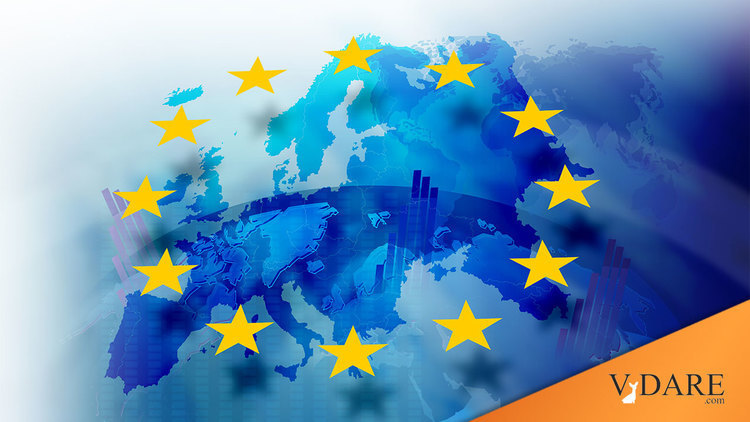
European Union Consumes Nations, Threatens U.S.
12/03/2002
Europe as we have known it is disappearing. Soon there will be no France, no Germany, no Italy, no Austria, no Spain, no Denmark, no Belgium, no Holland, no Greece, no Ireland, no Great Britain. Every country will be gone. In their place will be the European Union.
The sovereign countries of continental Europe and Great Britain are products of unique histories and rich cultural distinctiveness. Each country’s language, art, literature, philosophy, music, architecture, cuisine, and mores reflects the uniqueness of each country’s history.
This amazing diversity is to be replaced with an artificial creation that has no history and no language. What is the European Union but a centralized bureaucracy with a monetary unit?
What explains this amazing demise of countries, which, hitherto, were staunch guardians of their national identities?
The initial impetus came from the free trade belief that dismantling tariff boundaries would prevent wars by creating economic interdependence through the European Common Market. From this common market would come more wealth and prosperity to aid the postwar reconstruction of Europe and to thwart communist expansion.
Once the Common Market was underway, other arguments and developments turned a plan for economic integration into political union.
Arguments were made that free trade would have differential effects and be unfair unless countries had comparable tax, monetary and budgetary policies. The implication was extra-national law and a common currency.
French fear of Germany fueled determination to bind the countries in political union.
Intellectual and propagandistic assaults on "chauvinistic" national identities eroded country loyalties, while rising anti-Americanism produced a desire for a European superstate capable of resisting U.S. pressures.
Britain’s uncertainty of its place in the world, together with the Labour Party’s program of dismantling traditional England, placed the U.K. in European hands.
The finishing touch to the demise of the sovereignty of European countries is being supplied by a centralized European bureaucracy. Technically, the European Union is a treaty arrangement entered into by sovereign states. But in fact, the European Commission and a European "court" created to arbitrate disputes are creating European law and ruling by edicts. Witness the extraordinary fact that European Union law exists prior to the existence of the European Union state.
The European Union is creating itself by successfully exercising power. Various member countries complain and kick up a fuss, but EU edicts are regularly followed.
For example, since the dawn of aviation, sovereignty has meant the right of a country to control its own air space and the landing rights of foreign airlines. Recently, the "European Court" ruled that member countries had, unbeknownst to themselves, given up the right to enter into treaties relating to air service and declared all existing agreements null and void. The "court" asserted that sovereignty over airspace resided in the European Commission.
British opponents to European Union argue that constitutionally a British government cannot surrender Britain’s sovereignty to the European Union and that any such transfer is an act of treason.
These opponents, many of them legally learned, might well be correct. However, the test of sovereignty under international law is given by the answer to the question: "Are the edicts of the European Union regularly followed in the territories over which the EU claims governance?" If the answer to this factual question is "yes," then the European Union is the sovereign.
Many wonder what public choice model or theory of government behavior explains the willingness of national politicians to give up power by ceding sovereignty to the European Union. The surrender of sovereignty has dire implications for the British, because it means the end of the due process, habeas corpus and trial by jury — protections to which they are accustomed.
For the U.S. it means the loss of our most important ally and the rise of a competitive state and reserve currency.
Blind to the challenges that Europe will soon be hurling, the U.S. is preoccupied with Iraq, an insignificant state that can project neither military nor economic power.
No politician comprehends the implications of the demise of European sovereignties. Gabriel Kolko in his latest book, Another Century of War?, puts his finger on the problem:
"Those who become the leaders of states are ultimately conformists on most crucial issues, and individuals who evaluate information in a rational manner — and therefore frequently criticize traditional premises — are weeded out early in their careers."
Thus does the U.S. initiate war in the Middle East while ignoring the rise of major rivals, China and the European Union, capable of terminating U.S. hegemony in the Pacific and the Atlantic.
Paul Craig Roberts is the author with Lawrence M. Stratton of The Tyranny of Good Intentions : How Prosecutors and Bureaucrats Are Trampling the Constitution in the Name of Justice. Click here for Peter Brimelow’s Forbes Magazine interview with Roberts about the recent epidemic of prosecutorial misconduct.
COPYRIGHT CREATORS SYNDICATE, INC.
